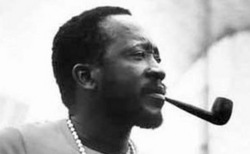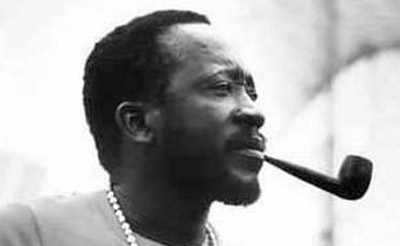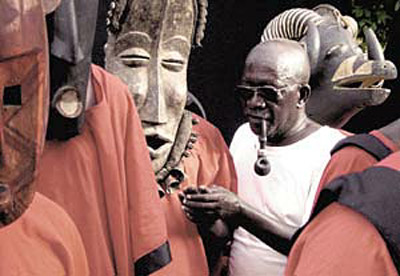He made a total of ten feature films during his career. His works often had a satirical tone and did not shy away from controversial subject matter. They dealt with such varied topics as impotence, religious oppression and the failures of post-Colonial Africa. His last film, "Moolaade," dealt with the formerly taboo subject of female circumcision. The film won two awards at the 2004 Cannes Film Festival. The National Society of Film Critics also gave it an award as Best Foreign Language Film.
Sembène was born in the Casamance region of present day Senegal, when it was a French colony. He was drafted into the French army during World War II, later settling in the country, where he worked as a docker and as a trade union activist.
In 1956, his first novel, "The Black Docker," was published. He wrote at least a half dozen books, including "Voltaiques," a collection of short stories, including the one that was the basis for his film, "La noir de..."
Sembène was a co-founder of the biennial Pan-African festival of film and television of Ouagadougou, commonly known as FESPACO.
He died at his home in Dakar, Senegal at the age of 84 after a long illness.
He made a total of ten feature films during his career. His works often had a satirical tone and did not shy away from controversial subject matter. They dealt with such varied topics as impotence, religious oppression and the failures of post-Colonial Africa. His last film, "Moolaade," dealt with the formerly taboo subject of female circumcision. The film won two awards at the 2004 Cannes Film Festival. The National Society of Film Critics also gave it an award as Best Foreign Language Film.
Sembène was born in the Casamance region of present day Senegal, when it was a French colony. He was drafted into the French army during World War II, later settling in the country, where he worked as a docker and as a trade union activist.
In 1956, his first novel, "The Black Docker," was published. He wrote at least a half dozen books, including "Voltaiques," a collection of short stories, including the one that was the basis for his film, "La noir de..."
Sembène was a co-founder of the biennial Pan-African festival of film and television of Ouagadougou, commonly known as FESPACO.
He died at his home in Dakar, Senegal at the age of 84 after a long illness.
Sponsored by Ancestry
Advertisement
Records on Ancestry
Advertisement



